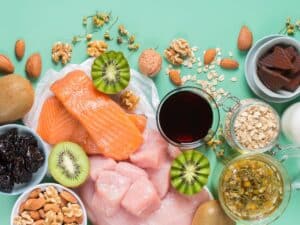
In the 1980s, scientists were positive tryptophan was helping the body produce niacin, which helps the brain produce serotonin, a well-known chemical that triggers sleep. While this effect has been shown to be true, it turns out that tryptophan doesn’t get to the brain too easily – as it competes with many other amino acids to pass the blood-brain barrier. Cheddar cheese, believe it or not, actually contains more tryptophan than turkey – but eating too much cheese hardly induces an afternoon nap.
The intricacies of tryptophan’s effects have to do with what you are consuming along with it – and on Thanksgiving, that is boatloads of food, in particular, foods laden with carbohydrates. Here’s the science behind it:
When you eat a meal of turkey – or even the tryptophan-rich cheddar cheese – most of the tryptophan doesn’t reach the brain as other amino acids win out. When you add carbohydrates to the mix – and lots of them – the body produces insulin in an effort to keep blood sugar in check. But insulin triggers the uptake of most amino acids by the muscles – removing them from the blood stream – except for the case of tryptophan, which then has a clear path to go straight to the brain without all of the competition.
So ironically, while tryptophan straight to the brain is likely to make you tired, it only gets there with help from those fabulous sides – potatoes, stuffing, and bread – and those sugar-rich treats – such as wine and pumpkin pie.
In conclusion, carbohydrates, refined sugar, and unsurprisingly, alcohol are the real culprits of your post-dinner drowsiness, giving tryptophan VIP access to convert to serotonin in your brain. So, as you sit down to a big feast with friends and family surrounding the dinner table – indulge and nap freely, just don’t pin your sleepiness on the turkey. Now go on and enjoy! Gobble, gobble. Happy Thanksgiving from iSpecimen.
For more information about tryptophan and what it does to your body, please visit the following resources:
The truth about tryptophan
The effect of raising and lowering tryptophan levels on human mood and social behaviour